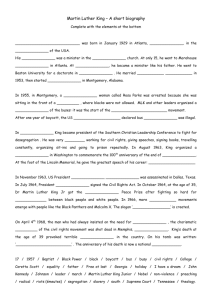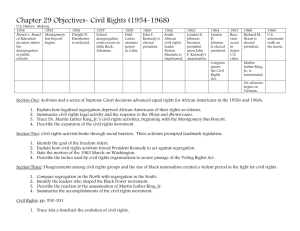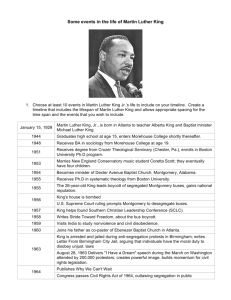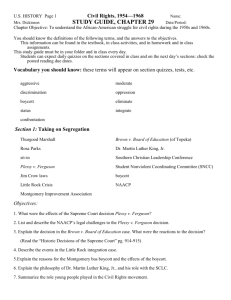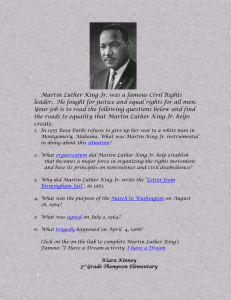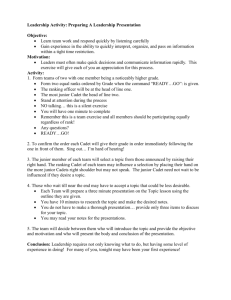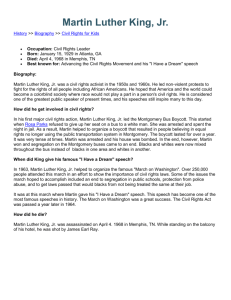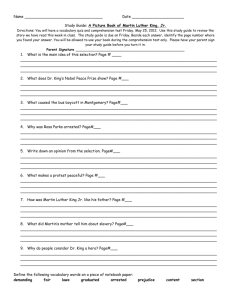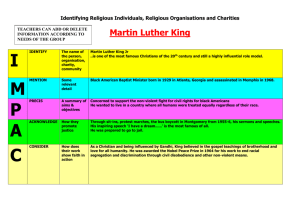Student Council Speech
advertisement
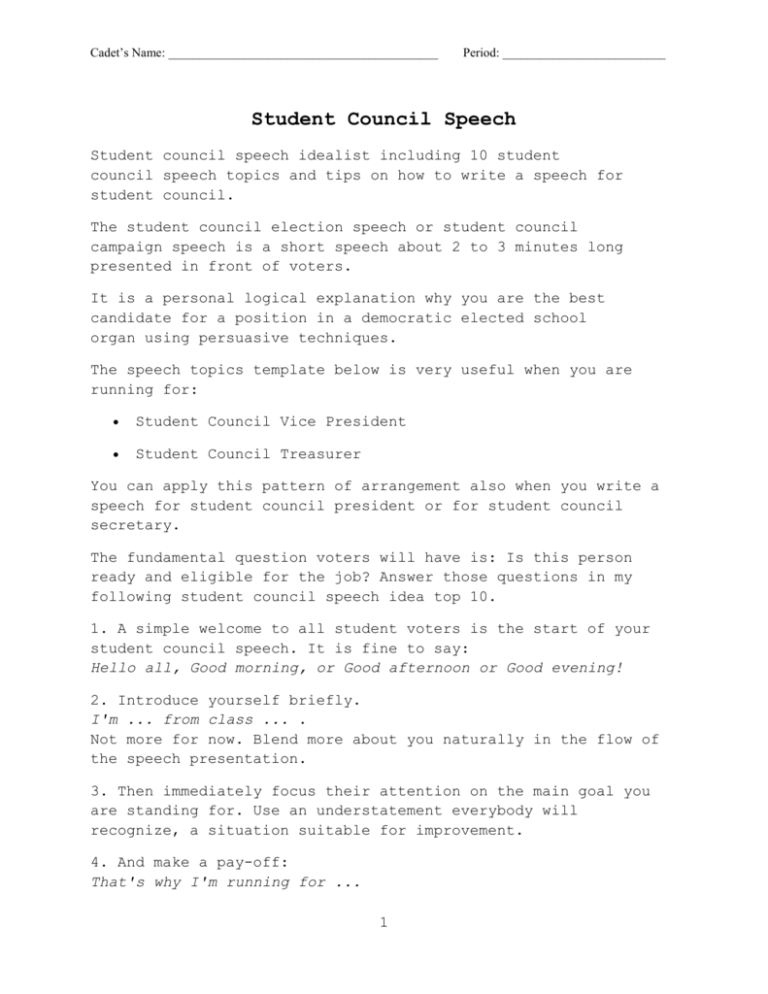
Cadet’s Name: ___________________________________________ Period: __________________________ Student Council Speech Student council speech idealist including 10 student council speech topics and tips on how to write a speech for student council. The student council election speech or student council campaign speech is a short speech about 2 to 3 minutes long presented in front of voters. It is a personal logical explanation why you are the best candidate for a position in a democratic elected school organ using persuasive techniques. The speech topics template below is very useful when you are running for: Student Council Vice President Student Council Treasurer You can apply this pattern of arrangement also when you write a speech for student council president or for student council secretary. The fundamental question voters will have is: Is this person ready and eligible for the job? Answer those questions in my following student council speech idea top 10. 1. A simple welcome to all student voters is the start of your student council speech. It is fine to say: Hello all, Good morning, or Good afternoon or Good evening! 2. Introduce yourself briefly. I'm ... from class ... . Not more for now. Blend more about you naturally in the flow of the speech presentation. 3. Then immediately focus their attention on the main goal you are standing for. Use an understatement everybody will recognize, a situation suitable for improvement. 4. And make a pay-off: That's why I'm running for ... 1 Cadet’s Name: ___________________________________________ Period: __________________________ fill in the position you want to achieve. So, be clear, take position: I want to become student council president / vice president / secretary / student council treasurer. How to work out these student council speech ideas? Well: If it is your first student council election campaign, use an easy-to-remember one line message to tell what your thoughts and views are on the position you want. If you go for a re-election, then the major student council speech idea has to be: state in one catchy phrase what your mission statement has been the past years and how you will continue your work. 6. Now tell your audience what you think are common needs at campus that ought to be fulfilled right away. 7. Present the solution; draw the contours of the positive outcomes of the strides you want to take for them. Keep in mind that this is a brief and triggering summary of your objectives, most wanted achievements, plans, views and solutions in relation to the needs of the voters. Consider them as the most important student council speech ideas you can think of. 8. Offer evidence why you are the best choice for the position. Avoid exaggeration of course. All have to be true. Do list you’re: a. Educational qualifications. b. Outstanding personal qualities. c. Main accomplishments or special activities in high school, college or university. d. And the specific qualifications you can think have related to the position you strive for. E.g. Proven leadership in community volunteering is the right ticket to become student council president. 9. Conclude with this student council statement: invite all to communicate ideas the coming years. Just like you say: My door is always open. I will be in office to fight for your 2 Cadet’s Name: ___________________________________________ Period: __________________________ needs. I am always open to suggestions. Mail me or look me up on Facebook. I am looking forward to meeting you! Encourage the voters to visit your webpage - if you have one and further inform their selves as to why they should vote for you. 10. Refer to your introduction statement; conclude that you are suitable, just in one teasing slogan. Of course in such a way that they will remember your core student council speech idea. And: look and listen how your competitors are doing. Copy their success parts in your own words, improve them. That is my secret bonus student council speech idea! Due during class on 1 Feb 2012. Or write a 250 word essay on the following question; Dr. King references a “sacred obligation” in his “I have a Dream” speech. What do you think this obligation is, in his view? How do you think that obligation could be achieved? 3 Cadet’s Name: ___________________________________________ Period: __________________________ Dr. Martin L. King Introduction King is a special two-hour documentary presentation which brings to life the epic story of one of the most important figures in American history for a new generation of viewers. Hosted by veteran journalist Tom Brokaw, this program commemorates the life and legacy of Dr. Martin Luther King Jr. on the fortieth anniversary of his death. King re-lives his remarkable journey for civil rights, from the moment he reluctantly joined the bus boycott in Montgomery, Alabama, through his rise as a world figure, to his tragic assassination in Memphis in 1968 at age 39. Conversations with close confidants including Andrew Young, John Lewis, and Harry Belafonte, together with rare interviews with family members, provide rich insights into his life, capturing his doubts and challenges alongside his victories and triumphs. With his roots in theology, Dr. King developed an inspirational speaking style that mobilized Americans to fight against racial injustice and segregation. From the bus boycott of the late 1950s through the historic 1963 March on Washington where he delivered his “I Have a Dream” speech, Dr. King became a key catalyst for change, driving the campaign for civil rights onto the national scene. King presents a retrospective and insightful exploration of this extraordinary leader, retracing his story and examining the indelible mark he left on the nation and the world. VOCABULARY Using a dictionary (www.merriamwebster.com) and an encyclopedia, students should define or explain the significance of the following terms: Bigotry civil disobedience Civil rights color-blind De facto de jure Integration citizen segregation 4 Cadet’s Name: ___________________________________________ Period: __________________________ VIEWING Question 1. Martin Luther King Jr. grew up in what neighborhood in Atlanta? 2. Who influenced King to become a minister? 3. Dr. King moved to ________ to start his career as a minister and political activist. 4. In 1956, the __________ Court declared that the segregated buses in Montgomery were illegal. 5. Martin Luther King learned about non-violence from Mahatma Gandhi, a leader in what country? 6. When Martin Luther King was 35, he was awarded the ________ Peace Prize. 7. What American leader is shown making a speech in this program after King’s death? 8. ________________ was president when Dr. King’s birthday was declared a holiday. 5 Cadet’s Name: ___________________________________________ 9. Period: __________________________ Write down a short quote Dr. King states in this program or that you have heard before. MATCHING ACTIVITY Match the following identifications in column 1 with its corresponding answer in column 2. Column 1 1. March on Washington ___ Column 2 2. Segregation ___ 3. 1986 ___ A. Separation of races, either legally or by custom 4. NAACP ___ 5. Civil disobedience ___ 6. “How long? Not long.” ___ B. Quote from MLK speech C. Major civil rights protest in 1963 D. The year King’s birthday was declared a national holiday E. A method of achieving change by pushing the boundaries of law F. Civil rights organization which plays a role in the Montgomery bus boycott 6
